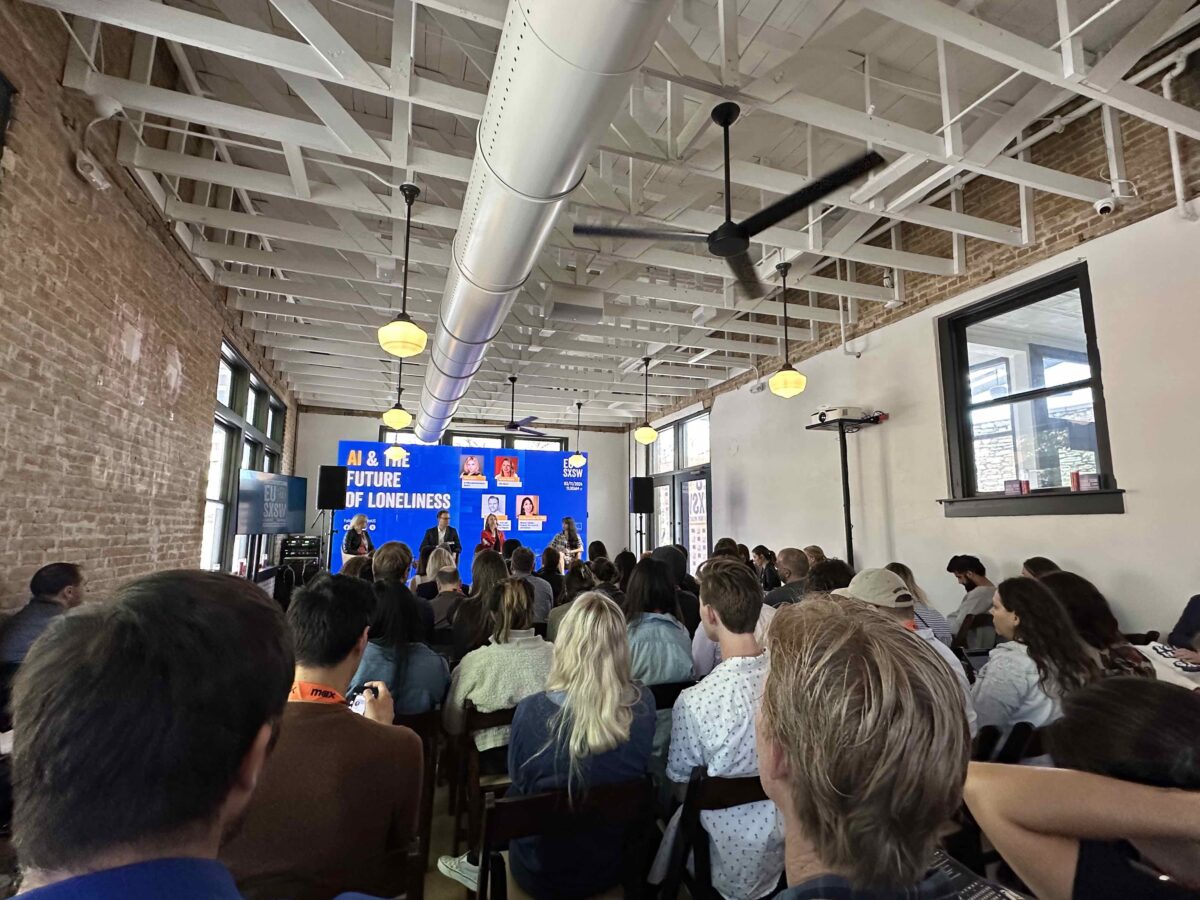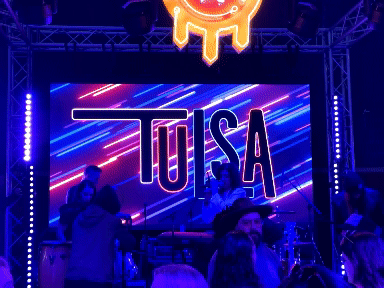Ivey, who researches belonging, thought it sounded like another lazy attempt by Silicon Valley insiders to replace community with technology.
Former Tinder CEO Renate Nyborg didn’t like the headline either, which was funny because it was about her new startup Meeno.
Nyborg says her company is only using AI to facilitate, not replace, real interaction between people, but all that nuance was lost in headlines and tweets; Ivey the researcher and Nyborg the entrepreneur were introduced to each other in misunderstanding. Fortunately the pair hashed things out in person, in Paris over coffee near the Seine last fall. Then they ended up on a panel together Monday at SXSW, the sprawling and multifaceted festival spanning music, film and technology held annually in Austin, Texas.
Their combative online introduction turned chummy in-person collaboration says something about big conferences, face-to-face meetings and how place-makers talk about home.
Before: Marketing stuff. Now: Marketing place
Ivey and Nyborg were half of a session discussing the impact technology and AI have on rising reports of loneliness in the rich world. They were upstairs at an Austin bar that had been rented and decked out by the European Union with decals, stickers and cultural exports. The EU was hardly the only jurisdiction brandishing its innovation and economic credentials in Texas this week.
After bruising twists during the pandemic that forced layoffs at the organization that produces one of the world’s signature tech and culture conferences, SXSW has returned to a state familiar to attendees from before the pandemic.
This week, the Austin Convention Center and nearby hotels host industry sessions that mix an eclectic range of celebrities — Megan Markle, marketing professor Scott Galloway — and hundreds of smaller-profile contributors. Many startups pitch, including whole regional delegations like a slate from Baltimore, perhaps for investors but also for prestige and the signal of validation.
Meanwhile an entire shadow conference has grown outside these formal sessions, including big marketing pop-ups, like the carnival from Audible and heavily programmed takeovers of local bars, called “houses.”
Those houses were once primarily run by companies hyping their products, and a few did again this year, like one from Sharpie and Paper Mate and another by Brand Innovators, a company that sells access to its community of brand marketers.
Once concentrated on Austin’s sticky-floored Sixth Street party bars, this year the densest collection was on Rainey Street, near big towers under construction to serve Austin’s decades-long booming population (today almost 1 million, double what it was in 1990). Over the last decade, these experiential marketing pop-ups have transitioned from exclusively marketing stuff to more recently marketing places.
On Saturday, the Stay Put Brewery was used to promote the 40th anniversary of cult-classic movie “The Texas Chain Saw Massacre”. On Sunday, after the ice sculpture of Leatherface melted away (seriously), a coalition of Philadelphia boosters stood up a one-day edition of the Amplify Philly house. By day, a group of creatives and tech champions scheduled programming to pull conference goers in — hey, I even spoke on a couple sessions — and by night rapper Chill Moody curated an evening of music. The economic development groups behind longstanding activations for Atlanta and Washington DC haven’t returned post-pandemic, so Amplify Philly might now be one of SXSW’s longest-running city-boosting houses.
For these activations, the big question wasn’t erased by the pandemic but the answers have shifted: What does a SXSW activation get you?
On the same block as Amplify Philly, boosters for the city of Tulsa were back with a multi-day activation mixing programming and music. It’s part of one of the country’s most ambitious local economic development strategies of the post-pandemic era: Tulsa Remote, a program funded by the George Kaiser Family Foundation to offer remote workers $10,000 and other perks to move to Oklahoma.
Brand marketers argue that billboards work, and a SXSW house is a big, loud billboard to put the Tulsa name into the minds of thousands of tech and creative professionals.
Where Tulsa is some of the biggest, newest money in this SXSW blend of experiential marketing blitz, other regions appear to be belt-tightening in our new economic era.
Those behind the one-time Michigan House came together with other state economic development groups to conjure the Midwest House, and several city economic groups collaborated on the Tennessee House. Birmingham, Alabama economic stewards hosted their first activation for one day, as did long-timers Amplify Philly — though organizers also sponsored a booth inside the sprawling convention center, where hundreds of exhibitors reflect a mix of tech companies and other business attraction orgs. Other city officials represented their homes; over the din of Tulsa music, Birmingham organizer Deon Gordon introduced me to Montgomery Mayor Steven Reed, who spoke at the conference and cheered his Alabama city.
Billboards to build community?
SXSW is disorientating because though heady conversations are courted, everyone is there to sell something. During SXSW, Austin’s bus shelters serve as both respite for down-trodden residents and colorful billboards hawking venture-backed cloud services. It’s like the old saying: dance like no one is watching and ride your e-scooter like you’re not the perfect representation of income inequality.
GenX made a music festival, and then Millennials turned it into a sprawling showcase of experiential marketing — hawking books and pens and homes.
To be sure, SXSW still includes music and film components, among a portfolio of other side conferences, but its focus on technology and startups during the heady 2010s defined the conference — and Austin’s boomtown reputation.
This brings us back to the charming notion that even after the pandemic ratcheted up remote work and video conferencing, so many tech people still show up in person to hand out promotional flyers. In many ways, I’m in awe of how SXSW has endured and how it continues to represent this moment, for good and for bad. Still, I wonder if we’re incorporating pandemic change.
Do throwing parties and buying drinks for conference goers track back to economic goals? Do idle tech workers today become tourists, residents or net promoters later?
A billboard is a physical interruption that inserts an idea into your consciousness. What happens later is a dizzying mental labyrinth that maybe leads to buying something. This uncertain attribution bedevils us publishers of news organizations too, who argue our truth telling is a good partner for billboards, but that can also be hard to prove.
It’s the same challenge these regional business-attraction activations have. Their struggle is my own.
Tulsa, Tennessee and Philadelphia, like Canada and the European Union for that matter, are all kinds of communities, with lots to offer — and also a complement of problems, as anywhere. Just like Sharpies, it’s somebody’s job to think about how to market those places for economic ends. This will all get harder as the global population declines. And maybe even more important. So stories matter more. Authenticity is a term we use to judge how embellished any given marketer’s story is.

Back at the European Union house after her session, the former Tinder CEO Nyborg and the researcher Ivey exchanged warm pleasantries before going their separate ways. I meant to say hello, but I fell into a conversation with a German entrepreneur and then had a call before I dashed to the airport. For all the digital tools we have access to, we were there in person, sharing what we were working on and cared about — just hoping to bring someone else a little closer to it all.
It’s what all those cities hope to do too. It’s funny that at a conference known for so much puffery we seek something genuine. That’s why place matters: It’s harder to fake, and up close, it’s much harder to hate.







